'...then Bangladesh would have been the world champions a long time ago.'
The reality is sadly different, says Bikash Mohapatra.
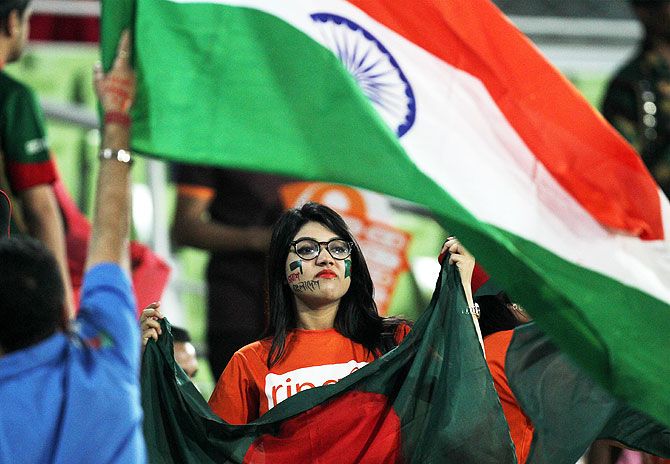
On the eve of the Asia Cup final, some folks in Bangladesh used social media to target the Indian cricket team.
An image of Bangladesh pacer Taskin Ahmed with Mahendra Singh Dhoni's head went viral.
The image was demeaning, derogatory, disgusting.
It wasn't unprecedented.
Last year, after Bangladesh managed a series win against India, the newspaper Prothom Alo produced a fake 'cutter' advertisement, in which seven Indian cricketers stood with their heads half shaven, with Mustafizur Rahman -- who shone with the ball in the series -- endorsing the 'cutter'.
The ad appeared after the series ended. The Indians had no opportunity to give it back... on the pitch, of course.
This time, some of the Bangladesh team's supporters tried playing mind games with the Indians.
The move boomeranged. And how!
Indians do give it back!
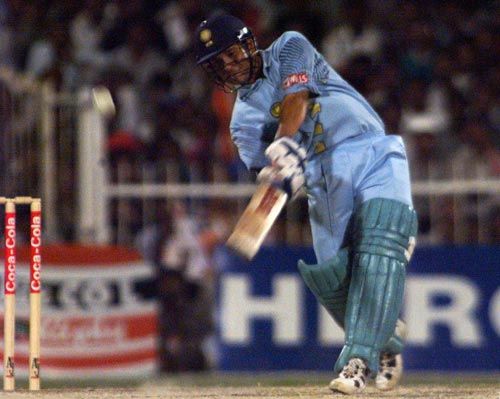
Be patient, play your game and you can beat Team India.
The Men in Blue have over the years often snatched defeat from the jaws of victory. Their opponents just need to stick to plans.
Of course, if the Indians are instigated, they are experts in giving it back. Indian players perform best when there is a point to prove.
In the 1996 World Cup, Aamir Sohail learnt it the hard way. Pakistan's stand-in captain, Sohail scored a quick-fire 50 and celebrated by hitting a Venkatesh Prasad delivery to the extra cover fence.
Sohail then riled Prasad by pointing to the region. The usually mild-mannered bowler responded by knocking Sohail's stumps over.
Likewise, Sachin Tendulkar, peeved at the manner Henry Olonga celebrated after dismissing him in a game in Sharjah in 1998, responded by smashing the Zimbabwean quick all over the park in the next match, en route to an unbeaten 124.
Tendulkar meted out similar treatment to Shoaib Akhtar in the 2003 World Cup after the Pakistan bowler vowed to get him out cheaply ahead of the game.
Steve Waugh called India the 'final frontier' and seemed confident when his all-conquering Aussie side won the opening Test in Mumbai in that famous 2001 series.
Sourav Ganguly and Co responded by winning the next two Tests -- the second Test at Eden Gardens after being asked to follow-on -- and the series.
There was no such hype during their subsequent tour in 2004 and Australia did manage an elusive series win on Indian soil. Adam Gilchrist succeeded where his illustrious predecessor had failed.
There are many such instances to illustrate the point.
Not that the Bangladesh team, and its passionate supporters, learnt anything from the examples above.
The result, India won a sixth title, thrashing the hosts by eight wickets, with seven balls to spare. The social media 'campaign' of their hosts did inspire, after all.
Where passion supersedes performance
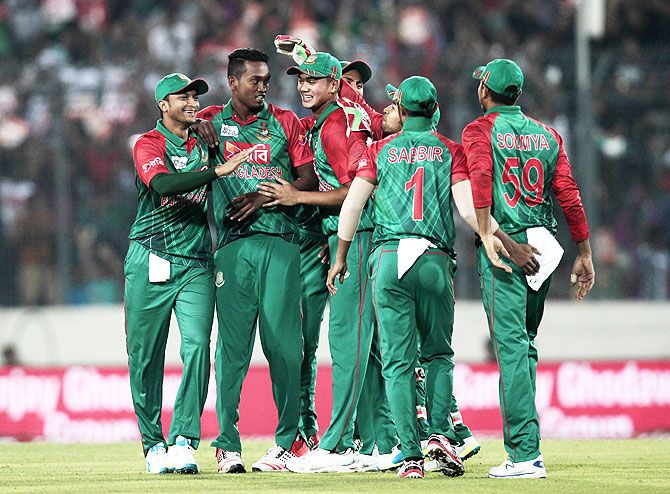
Bangladesh cricket has seldom been characterized by its national team's consistent performances. More often than not its got to do with the passionate fans and an over enthusiastic media.
During the 2006 ICC Champions Trophy, Bangladesh beat Zimbabwe in a league game at the Sawai Mansingh stadium in Jaipur.
As we wrapped up the day's work in the media box, the Bangladeshi media seemed hassled. Inquiries revealed that Muhammad Yunus, the founder of the Grameen Bank, had become the first Bangladeshi to win a Nobel Prize.
"It's a double-header," one Bangladeshi scribe said, describing the headlines in his nation's newspapers the next day. "Yunus has won the Nobel and Bangladesh has beaten Zimbabwe."
Now on which basis can a Nobel Prize be equated with a win in a league game?!
There are two things you notice about Bangladesh.
First, it's the eighth most populated nation on the planet with an area-population ratio worse than many countries. Second is the nation's passion for cricket.
Two of my three trips to the country came during the 2011 ICC World Cup. Ahead of the tournament opener (featuring co-hosts India) in Mirpur, a local scribe seemed confident about his team's fortunes.
"I know you are an Indian," he told me, "but Bangladesh is going to win the match." I wished him luck.
Ahead of the game the Sher-e-Bangla stadium was full; more than double those numbers were outside the ground. The celebrations continued till the wee hours of the morning. This despite India having won the game.
Bangladeshi crowds supported Pakistan and booed the West Indies during the 2011 World Cup quarter-final. The reason? The Caribbean side had bowled Bangladesh out for a paltry 58 in the league phase and dented their qualification prospects further by losing to India.
Yes, Prime Minister!
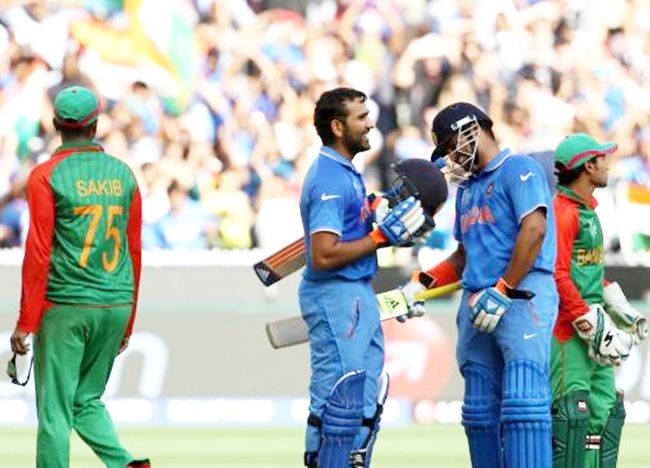
Ahead of the 2015 World Cup a special court allowed Rubel Hossain -- who was accused of rape -- to travel to Australia.
When the bowler played a key role in Bangladesh's win against England, and ensured a quarter-final berth, an emotional judge dismissed the case against Hossain on 'national interest' grounds.
When India thrashed Bangladesh in the quarters, riding on Rohit Sharma's brilliant 137, it provoked a national agitation.
A marginal no-ball call had one in the batsman's favor -- with Rohit on 90 -- and the whole of Bangladesh felt cheated.
For the record, India won by 109 runs, those 47 runs Rohit added after the 'reprieve' wasn't the difference.
Mustafa Kamal, the Bangladeshi who was then the International Cricket Council president, threatened to resign.
Prime Minister Sheikh Hasina jumped into the controversy and was quoted as saying that Bangladesh was 'made to lose because of wrong decisions by the umpire!'
If cricket had been only about emotion and passion, Bangladesh would have been the world champions, and the most dominating side, a long time ago.
The reality is, sadly, different.
Still minnows
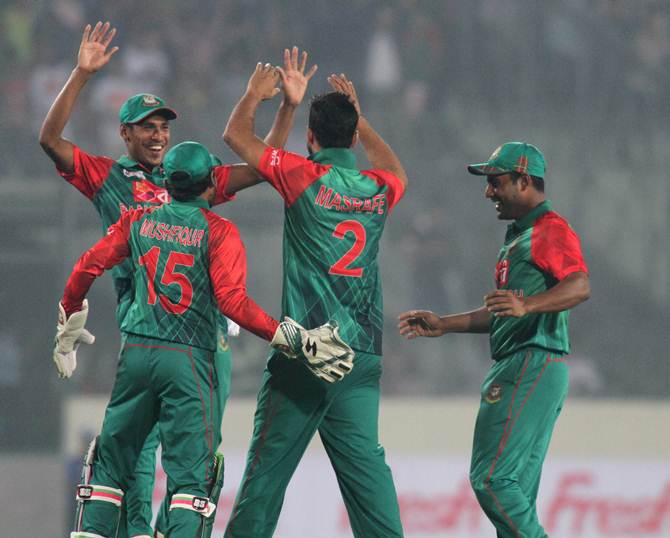
For a country that first played international cricket in 1986, Bangladesh has made scant cricketing progress.
The country has lost 68 per cent of its one-day matches, having played the format for 30 years. A solitary win against world champions Australia, three apiece against England and South Africa, four against Pakistan and five wins over India don't really make for world-beating credentials.
Likewise, 10 years of T20 cricket has ensured a loss percentage of 65. At a time when more cricket is being played than at any time in history.
And having gained the coveted Test nation status in 2000, Bangladesh has a 77 per cent loss ratio.
Among its seven Test wins, five have come against fellow strugglers Zimbabwe.
Zimbabwe deserve credit for renouncing its Test status between 2005 and 2011 when its board felt it was not good enough to compete in the format.
Imagine Bangladesh doing that!
After so many years in international cricket, a Bangladesh win is as much about the opponent's poor performance as it is for the team's heroics.
If the top teams play at their very best, this Bangladesh side will struggle to compete, let alone win.
That Bangladesh have to qualify for the World T20 doesn't come in as a surprise. It only corroborates the inconsistencies of the team, notwithstanding its many passionate fans and their social media antics.












 © 2025
© 2025